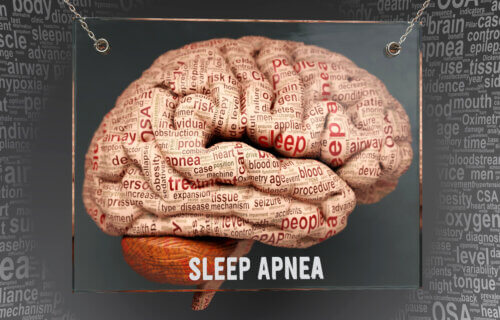MINNEAPOLIS — Researchers have already made a connection between sleep apnea and an increased risk of developing dementia. Now, a new study is exploring the connection between sleep apnea and brain volume. The study focused on individuals who exhibited amyloid plaques in the brain, which scientists believe are early indicators of Alzheimer’s disease, but had no memory problems. Not only is there a connection, but results show the two conditions may contribute to a shrinking brain.
“We found that people with amyloid plaques who had more severe sleep apneas also were more likely to have lower volumes in the medial temporal lobe area of the brain, including the hippocampus, which plays a role in memory and Alzheimer’s disease,” says study author Geraldine Rauchs, Ph.D., in a media release. “The people who did not have amyloid plaques did not have this lower brain volume, even if they had severe sleep apneas.”
It is important to note that the study does not establish a causal relationship between sleep apnea and lower brain volume; it simply highlights an association. The research involved 122 participants with an average age of 69, who underwent brain scans, memory tests, and overnight sleep studies conducted in their homes. The memory tests were repeated after an average of 21 months.

Rauchs emphasizes that while the results suggest that some individuals may be more vulnerable to the adverse effects of sleep apnea, further research is still necessary. The findings raise the question of whether treating sleep-disordered breathing could potentially improve cognition, delay neurodegeneration, and enhance brain health.
The study also revealed a general association between lower volumes in the hippocampus at the beginning of the study and lower scores on tests of episodic memory at the end of the study. However, there were no direct associations between sleep apnea at the beginning of the study and memory scores at the end.
It is worth mentioning that the study had certain limitations. The same version of the verbal learning test was used at the start and end of the study, which could have minimized memory decline due to familiarity with the test.
As researchers continue to uncover the intricate relationship between sleep disorders and neurodegenerative diseases like Alzheimer’s, it becomes increasingly important to raise awareness about sleep health and its impact on brain function. Understanding the potential risks associated with sleep apnea can aid in early detection and intervention, potentially leading to better cognitive outcomes and overall brain health.
The study is published in the journal Neurology.
You might also be interested in:
- Depression drug reboxetine may help relieve sleep apnea
- Spending too much time alone may shrink and damage the brain, study reveals
- Brushing your teeth keeps your brain from shrinking, reduces risk of dementia
- New vaccine shows promise of slowing or even preventing Alzheimer’s disease


Bravo! This study reflects more than 20 years of disparate research and clinical experience showing the importance of oxygen to brain function. For more information check out our chapter on the brain-breathing connection in “Dementia Prevention: Using Your Head to Save Your Brain “ (John’s Hopkins Press) 2023